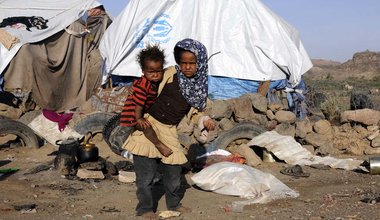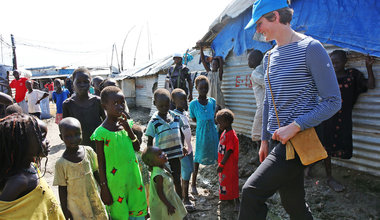Iraq: UN and partners race to reach thousands fleeing areas west of Ramadi
The United Nations relief wing today reported that humanitarian partners are rushing to provide emergency assistance to an estimated 35,000 people who have been newly displaced in hard-to-reach areas west of Ramadi.
“Thousands of people who have been trapped in Heet for months are trying to reach safety,” Lise Grande, the UN’s Humanitarian Coordinator in Iraq said in a press release from the UN Office for the Coordination of Humanitarian Affairs (OCHA).
She stressed that the UN does not have full access and “we are very worried that some of the families who are escaping are in areas very close to the front lines. We are worried for their safety.”
According to OCHA, displaced families are receiving ready-to-eat food, safe drinking water and hygiene kits through the Rapid Response Mechanism, which is managed by the UN Children’s Fund (UNICEF) and the World Food Programme and supported by the UN’s Population Fund (UNFPA), the International Organization for Migration (IOM) and nine non-governmental organizations.
Health assistance is being provided by the World Health Organization (WHO), which has dispatched two mobile health clinics and two medical teams.
“You can tell how difficult conditions are in Heet by how many people are seeking urgent health assistance. The mobile clinics dealt with 1,300 consultations during just their first two days,” explained Mr. Grande.
Prior to the displacement from Heet, more than 53,000 people had been displaced in Anbar Governorate since the beginning of the year. Many of these families have sought safety and help in already overcrowded camps and temporary settlements in and around Ameriyat al Falluja internally displaced persons complex, Habbaniyah Tourist City, and Bzebiz bridge.
The United Nations and partners have requested $861 million for 2016 to provide emergency relief to 7.3 million vulnerable Iraqis. Only nine per cent – $75 million – has been received so far.
“The humanitarian crisis in Iraq continues to worsen. Additional resources are urgently needed so we can help people who depend on humanitarians to survive,” said Ms. Grande.
OCHA says that the humanitarian crisis in Iraq is highly complex, volatile, becoming protracted and expected to widen and worsen in the year ahead. The crisis is driven by unpredictable, massive waves of displacement caused by armed conflict. From January 2014 to November 2015, 3.2 million people were forced to flee their homes in several big waves of displacement, and multiple smaller ones.
 UN
UN






